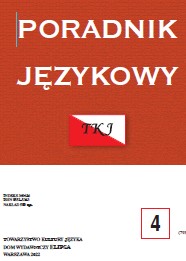WYRAŻENIE MŁODE WILKI WE WSPÓŁCZESNYM JĘZYKU POLSKIM
THE EXPRESSION MŁODE WILKI (YOUNG WOLVES) IN THE CONTEMPORARY POLISH LANGUAGE
Author(s): Dorota Połowniak-WawrzonekContributor(s): Monika Czarnecka (Translator)
Subject(s): Lexis, Western Slavic Languages
Published by: Dom Wydawniczy ELIPSA
Keywords: idiom; modification;
Summary/Abstract: The idiom młode wilki (young wolves), with an additional meaning ‘young, entrepreneurial, go-getting people, who climb the career ladder fast, are extremely successful in a given field’ exists in the contemporary Polish language. The meaning of this expression reveals the following semes that are significant for the stereotype of wolf: ‘predacious’, ‘aggressive’, ‘hostile’, ‘distrustful’, ‘wild’, ‘dangerous for a human being’. Such a meaning of this idiom has been established under the influence of a film directed by J. Żamojda and the song titled Obława (Hunt) by Jacek Kaczmarski although the impact of the film seems to be predominant here. In the contemporary Polish texts, the expression młode wilki can be found in both standard and modified forms: these are usually innovations with additions, cf. e.g. młode wilki polskiego kina (young wolves of the Polish cinematography), młode wilki obozu władzy (young wolves of the ruling camp), and młode wilki biznesu (young wolves of business).
Journal: Poradnik Językowy
- Issue Year: 2022
- Issue No: 04
- Page Range: 103-108
- Page Count: 6
- Language: Polish
- Content File-PDF

